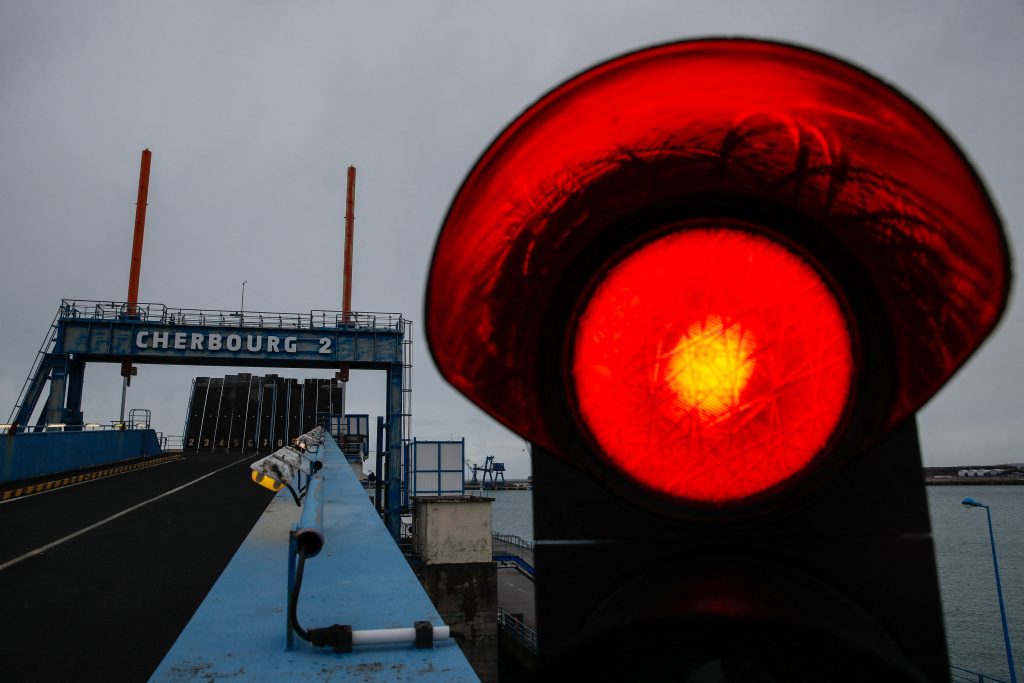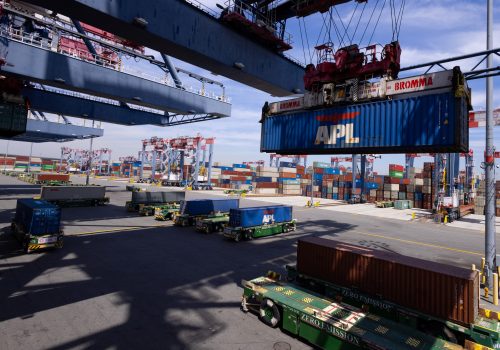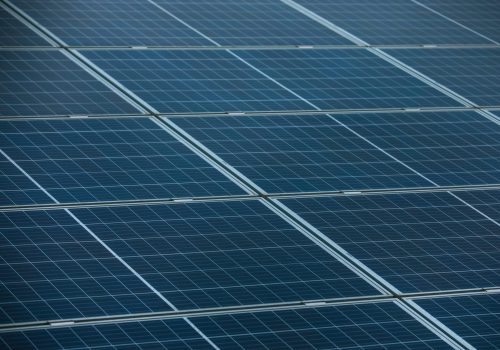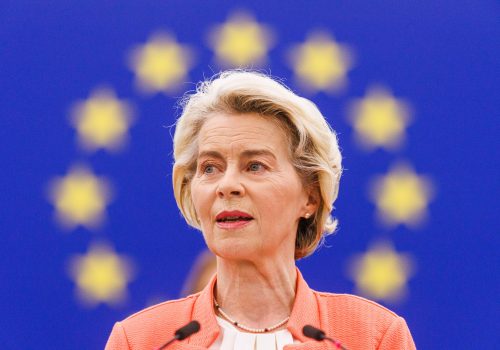Rapid advancements in technologies and the global race to net-zero will continue to drive demand for critical minerals—the building blocks of modern technologies—for the foreseeable future. Already, China has used its advantageous position in supply chains to curb critical mineral exports. China’s commerce ministry in July announced that it would restrict exports of critical minerals such as germanium and gallium. Now, as global competition in critical minerals heats up—an anticipated four hundred billion dollar industry by 2050—shoring up capacity and de-risking critical minerals supply chains will be key for both the economic competitiveness and green agenda of the European Union (EU).
While the much-anticipated US-EU critical minerals agreement is still under negotiation, the Biden administration and von der Leyen commission have shown a willingness to move past the dispute over the Inflation Reduction Act. The EU and United States have already, for example, increased cooperation on critical minerals supply chains, such as the continued convening of the secure supply chains working group under the US-EU Trade and Technology Council, with a goal of addressing potential economic coercion by China. Yet with future unknowns bedeviling US-EU trade relations—namely elections and divergent approaches on open trade—as well as China’s dominance in critical minerals mining and processing, the EU needs to swing into action. With estimates showing the EU’s mining industry is fifteen years behind Beijing and a staggering 98 percent of Europe’s rare earth metals are imported from China, there is a lot of ground for the EU to make up.
This isn’t to say the EU is sitting idle. When the US Congress passed the Inflation Reduction Act in 2022, the blow to the EU’s green tech sector became a catalyzing moment. In March 2023, the European Commission announced the Critical Raw Materials Act mandating that at least 10 percent of EU critical raw materials be mined and 40 percent processed in Europe by 2030. The legislation is expected to accelerate permitting procedures for new mines and alleviate some of Europe’s capacity issues (though implementation won’t be easy nor happen overnight). The EU is likewise pursuing new strategic partnerships on critical minerals in an effort to diversify its critical raw materials (CRM) supply chains. However, as the vast majority of EU imports of CRM are exempt from tariffs, new trade agreements alone offer little in terms of added benefits from new investments or economic incentives. The EU should pursue more ad hoc measures, particularly as Argentina throws a spanner in the EU-Mercosur trade pact and overall “fatigue” over stalled free trade negotiations in the EU sets in.
One possibility for action is the EU’s forthcoming Critical Raw Materials Club for all like-minded countries, which seeks to strengthen the global CRM value chain in cooperation with allies and partners. At present, the Critical Raw Materials Club lacks structure, but it holds potential as a useful trade tool to pool investment into “resource rich” countries in the global value chain. As the EU faces an uncertain economic and geopolitical future ahead, it is important that the EU works quickly to link its CRM diversification efforts with others, especially with its largest trading partner, the United States.
EU should stand up the Critical Raw Materials Club
As it stands, the Critical Raw Materials Club aims to invite allies and partners to participate in what would primarily be a buyers’ cartel that would pool investment and facilitate coordination of market behavior among members in line with geopolitical and economic security concerns. The EU has already extended invitations to like-minded allies such as the United States, partly to prevent competition over the same resources.
However, the Club cannot be solely a buyers’ cartel, as that would put downstream pressure on critical mineral producers while the global market for them is volatile. And, although China has the existing advantage in terms of speed and scale for such partnerships, the EU can offer more reliable investments with ESG goals instead of greater potential risk of exploitation, which China has been accused of doing. Consequently, the Club should aim to place both the advanced economies of the EU and its allies on fairer footing with critical mineral exporters to prevent the former from unfairly exploiting the latter. This would ensure that critical mineral exporters should not have to choose between trade with the Club and their own economic development.
EU should work with key allies including in the Indo-Pacific
Like the EU, the United States has been moving toward safeguarding its own supply chains. In May 2022, President Joe Biden announced the Indo-Pacific Economic framework (IPEF), a trade initiative meant to, among other priorities, strengthen supply chain resilience in the region. Taking it a step further, at the August 2023 Camp David Summit, the United States, Japan, and South Korea pledged to develop a pilot form of the IPEF supply chain Early Warning System (EWS) to share information on supply chain resiliency. Notably, the trilateral declaration not only highlighted critical mineral supply chains as an area of interest, but also explicitly suggested linking the EWS to “complement” existing mechanisms with the European Union.
As such, along with the United States, the EU should welcome Japan and South Korea into the Club during its establishment. Given their position in supply chains to China, Japan and South Korea will face the impact of Chinese-led disruptions faster than the United States and the European Union, making them strong economic bellwethers. This is especially true for critical mineral supply chains. As Europe has had increasingly close trade relations with Japan and South Korea, inviting them both would complement their similar goals of securing critical mineral supply chains and avoiding competition with their allies.
Discussions that are already happening on critical mineral supply chains at the Group of Seven (G7) summit and ministerial levels offer the opportunity for the EU to deepen cooperation. Although South Korea is not a formal member of the G7, it was represented at the G7 Hiroshima summit in May by South Korean President Yoon Suk Yeol—entrenching South Korea’s position in G7-level and adjacent discussions.
Political challenges
Taken together, there is much that the EU should take stock in for its work in supply chain resiliency including in cooperation with the United States. All things considered, the outcome of next year’s US presidential election could inhibit cooperation on a number of transatlantic agenda items including on critical minerals. The EU should look to institutionalize the Critical Raw Materials Club, working with like-minded partners and allies, to anchor itself within the global CRM supply chain and do so ahead of next year’s elections to ensure better longevity.
Nicole Lawler is a program assistant in the Atlantic Council’s Europe Center.
Francis Shin is a research assistant in the Europe Center.
Further reading
Wed, Oct 18, 2023
Designing a US-EU industrial and trade policy
Issue Brief By
Both sides of the Atlantic are confronting the geopolitical necessity of adapting trade and industrial policies to be fit for purpose in an increasingly competitive world. To avoid competition between Washington and Brussels, policymakers must recognize each side’s priorities and commit to further cooperation to bridge the transatlantic economic relationship, not widen it.
Wed, Sep 6, 2023
Policy memo: A NATO-style spending target could fund long-term decarbonization
In-Depth Research & Reports By Ben Judah, Francis Shin, Rachel Rizzo, Théophile Pouget-Abadie
EU member states and like-minded allies should set national-level spending targets, each based on a percentage of their respective annual GDPs, for decarbonization-related purposes. This would provide the basis of an international coalition that would ramp up global climate spending and set a useful benchmark to anchor high-level diplomatic discussions on the subject.
Thu, Sep 14, 2023
Reading between the lines of Ursula von der Leyen’s ambitious vision for the EU
New Atlanticist By
The European Commission president delivered her annual speech on the state of the European Union on September 13 in Strasbourg.
Image: A view shows the Cherbourg Harbour, France, January 21, 2021. REUTERS/Gonzalo Fuentes



